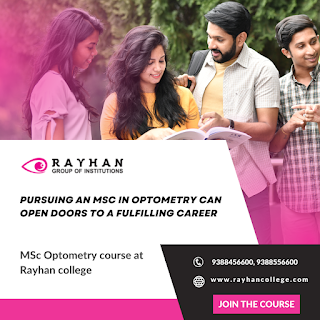Confused Between a Diploma and BSc in Optometry? Here's How to Choose the Right Path
Choosing a career in vision care is a smart move. With eye-related disorders on the rise and awareness growing about the importance of eye health, optometry has become one of the most in-demand allied health professions in India. But if you’re just getting started, you may be wondering: Should I pursue a diploma in optometry or go for a full-time BSc degree?
This confusion is common among students across Kerala who are passionate about healthcare but unsure of which academic path best suits their goals. Let’s break it down, explore the differences, and help you make an informed decision based on your future plans.
Understanding the Core Differences
Both a diploma in optometry and a BSc in optometry can lead to a career in vision science, but the depth of training, academic scope, and future opportunities differ significantly.
🩺 Diploma in Optometry:
Duration: Usually 2 years (sometimes includes internship)
Focus: Basic eye testing, dispensing, and clinical assistance
Entry Requirement: 10+2 (Science stream, mostly Biology)
Ideal For: Students looking for a quick entry into the job market or those with financial/time limitations
🎓 BSc Optometry:
Duration: 3 years + 1-year clinical internship
Focus: Comprehensive education in vision science, eye diseases, ocular anatomy, optics, and clinical practice
Entry Requirement: 10+2 with Biology, Chemistry, Physics
Ideal For: Students aiming for long-term careers, specialization, or further studies (MSc, research, etc.)
Career Scope After Each Course
If your goal is to work quickly and gain hands-on experience, a diploma might suit you. Diploma holders often work as:
Vision technicians
Optical sales assistants
Refractionists in eye hospitals or clinics
However, a BSc in Optometry opens the door to broader and better-paid opportunities, including:
Clinical optometrists
Low vision specialists
Pediatric or geriatric vision consultants
Eye care practitioners in hospitals or independent clinics
Eligibility for postgraduate studies (MSc Optometry, Public Health, etc.)
More importantly, many private hospitals, corporate eye chains, and global recruiters now prefer BSc-qualified professionals due to their advanced understanding and training.
Growing Demand in Kerala for Skilled Optometrists
Kerala, known for its excellent healthcare system, has seen increasing demand for trained optometry professionals—especially with the rising prevalence of digital eye strain, diabetic retinopathy, and age-related vision issues.
Educational institutions across the state are offering quality programs to meet this demand. If you're exploring BSc Optometry colleges in Kerala or want to compare options for diploma programs, start by looking for institutes that offer:
Strong clinical training partnerships
Experienced faculty in vision sciences
Updated curriculum aligned with healthcare trends
Internship support and placement assistance
One such example is Rayhan College, which offers both degree and diploma options in optometry for students who want to build strong careers in eye care. Learn more at:
👉 https://www.rayhancollege.com/bsc-optometry-colleges-in-kerala/
How to Choose the Right Path for You
Ask yourself:
Do I want to specialize and grow in optometry long-term?
Am I interested in research or post-graduate study?
Do I need a faster route to employment due to personal constraints?
Am I looking for job security or a higher salary package?
If your answers lean toward deep learning, growth potential, and flexibility, a BSc in Optometry is likely your best bet.
Final Takeaway
The field of optometry is evolving rapidly, and so are the opportunities. Whether you choose a diploma or a BSc degree, what matters is choosing a program that equips you with strong clinical knowledge, hands-on training, and future mobility.
Still unsure? Visit trusted institutions to compare curriculum, infrastructure, and student outcomes.
Start here: https://www.rayhancollege.com/bsc-optometry-colleges-in-kerala/

.png)


Comments
Post a Comment